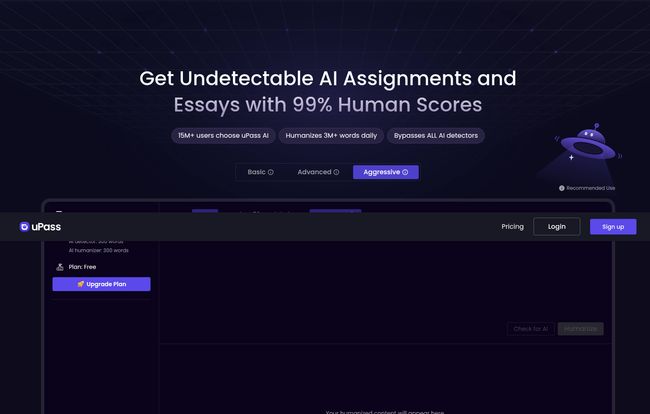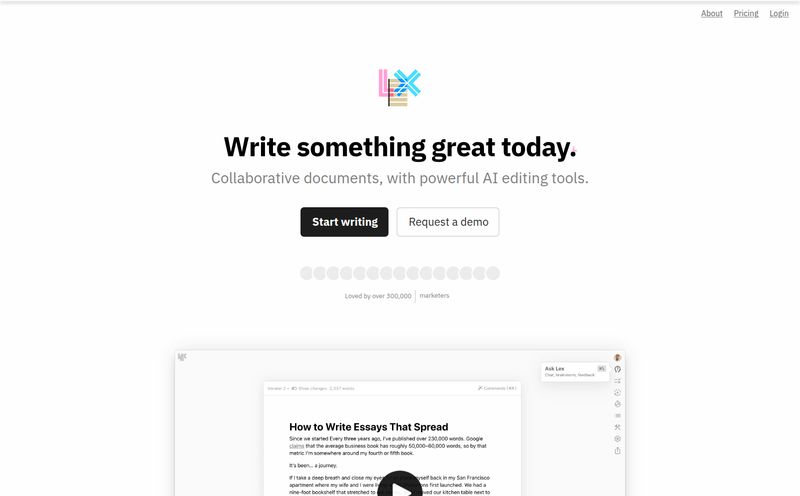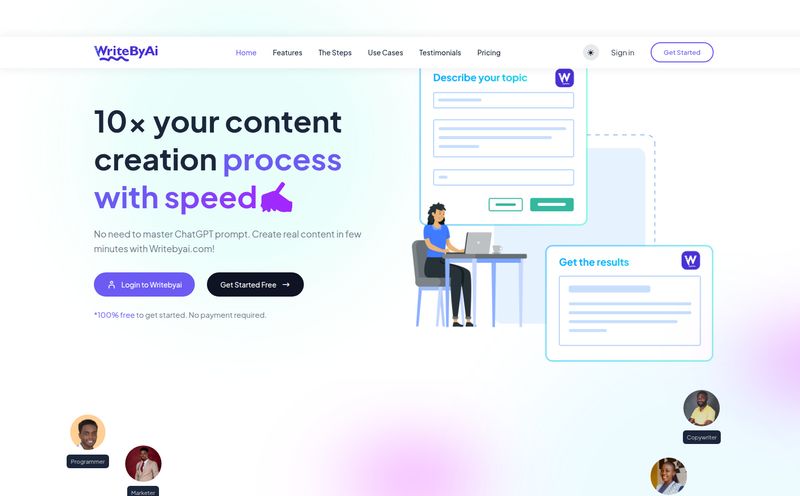Alright, let’s have a real chat. The world of content and SEO is in the middle of a massive shakeup. We’ve all seen it. The rise of generative AI like ChatGPT has been... well, it’s been something else. It's a fantastic tool for brainstorming, for getting over writer's block, for drafting. But it comes with a new problem: the rise of the AI police.
I’m talking about AI detectors. Turnitin, GPTZero, Originality.ai... the list goes on. They've become the digital gatekeepers, and if you’re a student, a blogger, or a marketer using AI to streamline your work, you've probably felt that little bead of sweat when you hit “submit.” Is this going to get flagged? Does my writing sound like a robot wrote it?
It’s a classic cat-and-mouse game. And in this game, new players are always emerging. Today, we’re looking at one of those players: uPass AI. It makes a bold claim: to make your AI-generated text completely undetectable. So, I decided to pop the hood and see what’s really going on. Is this the key to flying under the radar, or just another tool that’ll be obsolete next month?
What Exactly is uPass AI?
At its core, uPass AI is a two-sided coin. On one side, it’s an AI text humanizer. You feed it text that was written or assisted by an AI, and it rewrites it to sound more, well, human. It aims to strip out the tell-tale signs that detectors are trained to spot—things like predictable sentence structures and a certain lack of linguistic flair.
On the other side, it’s an all-in-one AI detector. This is actually a pretty clever feature. Instead of you having to copy-paste your text into five different free checkers, uPass AI runs it against a gauntlet of popular detectors at once. It gives you a snapshot of how your text might be perceived out in the wild.
And let's be clear about their target audience. The landing page is covered in phrases like “Get Undetectable AI Assignments and Essays.” They’re talking directly to students. This isn't just for bloggers like me; it's a tool built for the academic world, a world where getting flagged by Turnitin can have some serious consequences.

Visit uPass AI
The Big Question - Does uPass AI Actually Work?
This is the million-dollar question, isn't it? uPass AI claims it can beat the big dogs: GPTZero, Copyleaks, and yes, even the dreaded Turnitin. From my years in this business, I've learned to be a healthy skeptic. The digital arms race between content creators and detection algorithms is relentless. What works today might not work tomorrow.
But from what I've seen, uPass AI isn't just a simple article spinner from the old days of black-hat SEO. Those things would just swap out words for synonyms, leaving you with a garbled mess. uPass uses its own advanced language models to analyze the meaning and context of your original text. It then rebuilds the sentences from the ground up, injecting that human-like variation in word choice and sentence length. It even offers three different “humanization modes” to let you tweak the output for your specific needs.
So, can it work? Yes, I believe it can. The technology is sound. But it's crucial to understand this isn't a magic wand. As detectors get smarter, tools like uPass will have to get smarter too. It's a constant evolution.
A Look at the uPass AI Features
Let's break down the main components you get when you sign up.
The AI Text Humanizer
This is the main event. The interface is dead simple. You paste your text, choose your humanization mode, and click a button. The tool gets to work, rephrasing and restructuring. The goal is not just to evade detection but to do so while maintaining the original meaning of your work. It also claims the output is 100% plagiarism-free, which is a critical promise, especially for students.
The All-in-One AI Detector
I have to say, I really like this feature. It's a huge time-saver. Seeing how your text scores on ZeroGPT, Content at Scale, and others all on one screen is incredibly useful. It gives you a more holistic view of your content's “detectability” and helps you understand which parts of your text might still be setting off alarms.
Support for Multiple Languages
This is a big deal for a global user base. uPass AI supports over 50 languages. So whether you’re writing an essay in Spanish, a report in German, or a blog post in French, the tool is designed to help. That's a significant advantage over many competitors who are often English-centric.
Let's Talk Pricing - What's the Damage?
Okay, let's get down to brass tacks. Every tool has a price tag, and uPass AI has a few different tiers. Here’s a quick rundown of what they're offering, based on their pricing page:
| Plan | Price (Monthly) | Key Features |
|---|---|---|
| Free | $0.00 | 300 words/month. A good way to test the waters, but that's about it. |
| Basic | $9.99 | 5,000 words/month, bypasses ZeroGPT, GPTZero, Copyleaks. |
| Pro | $12.99 | 30,000 words/month, adds bypass for Turnitin, Originality.ai, and more. |
| Unlimited | $12.99 | Unlimited words, all features, priority support. |
Note: As of this writing, the Unlimited plan is listed at the same price as the Pro plan, down from $79.99. That feels like a promotional deal, and frankly, it's a no-brainer if you're choosing between the two.
The free plan is… well, it’s free. 300 words won't get you far, but it's enough to see the interface and run a short paragraph through. The paid plans are where the real power is. For any student or writer dealing with multiple assignments or articles a month, the Pro or Unlimited plan seems to be the sweet spot, especially with that current pricing.
The Elephant in the Room - Academic Integrity
I can't write about a tool like this without addressing the ethical questions. Some might argue that using an AI humanizer is just cheating, plain and simple. And if you’re taking a 100% ChatGPT-generated essay, running it through uPass, and submitting it as your own original thought… they have a point. That's not using a tool; that's academic dishonesty.
However, in my experience, the reality is more nuanced. I’ve always felt that AI is best used as a collaborator. It can help you build an outline, suggest different ways to phrase a complex idea, or help you generate a rough first draft when you're staring at a blank page. The problem is that even this legitimate, collaborative use can sometimes produce text that gets flagged.
This is where I see the responsible use case for a tool like uPass AI. It's not for passing off a robot's work as your own. It's for polishing your AI-assisted work to ensure your own ideas, refined with the help of a machine, don't get unfairly penalized by another machine. It’s about taking back control and ensuring the final product reflects a human touch, even if a tool helped you get there.
My Honest Take - The Good and The Not-So-Good
So after digging in, what’s my takeaway? Overall, I'm pretty impressed with what uPass AI is bringing to teh table. The dual functionality of a humanizer and an integrated multi-detector is smart. It’s a digital Swiss Army knife for anyone navigating this new AI-driven content world. It seems effective, the interface is clean, and the multi-language support is a huge plus.
On the flip side, the free plan is so limited it's more of a teaser than a tool. And my biggest reservation remains the fact that its effectiveness is tied to a battle it can't definitively win. AI detectors will get better, and this tool will have to keep adapting. You're buying a solution for today's problem, and you have to trust the developers to keep up with tomorrow's challenges. The potential for misuse is also there, but that’s true of almost any powerful technology.
Frequently Asked Questions about uPass AI
- Can uPass AI really bypass Turnitin?
- According to their claims, yes. The Pro and Unlimited plans are specifically designed to rewrite text to get past tough detectors like Turnitin and Originality.ai. However, results can always vary as detection software is constantly updated.
- Is using uPass AI considered cheating?
- This depends entirely on how you use it. If you're using it to polish your own AI-assisted draft and ensure it reads naturally, most would consider that using a writing tool. If you're trying to pass off 100% AI-generated work as your own, you're crossing a line into academic dishonesty. Use it responsibly.
- How is uPass AI different from a simple paraphraser?
- Simple paraphrasers or spinners just swap words with synonyms, often resulting in nonsensical text that still sounds robotic. uPass AI uses a more sophisticated language model to understand the context and rewrite the content from the ground up for better flow, coherence, and a more human tone.
- Is the content from uPass AI plagiarism-free?
- Yes, the tool is designed to generate completely unique content based on your input. It rewrites sentences so extensively that the output should pass any standard plagiarism checker, in addition to bypassing AI detectors.
- What if I'm not a student? Is it still useful?
- Absolutely. While it's heavily marketed to students, any content creator, SEO professional, or marketer who uses AI for drafting content can benefit. It helps ensure your blog posts, web copy, and marketing materials don't have that sterile, AI-generated feel.
The Final Verdict on uPass AI
So, is uPass AI worth your time and money? If you are a student, writer, or content creator who is actively using AI tools in your workflow, my answer is a solid yes. It directly addresses a very real and current pain point: the fear of the AI detector.
It’s a capable, well-designed tool that does what it says on the tin. The all-in-one detector is a standout feature, and the humanizer seems powerful enough to handle the current generation of detectors. Just remember to use it as a tool for refinement, not a machine for deceit. It's a powerful ally in the ongoing dance between human creativity and artificial intelligence.



